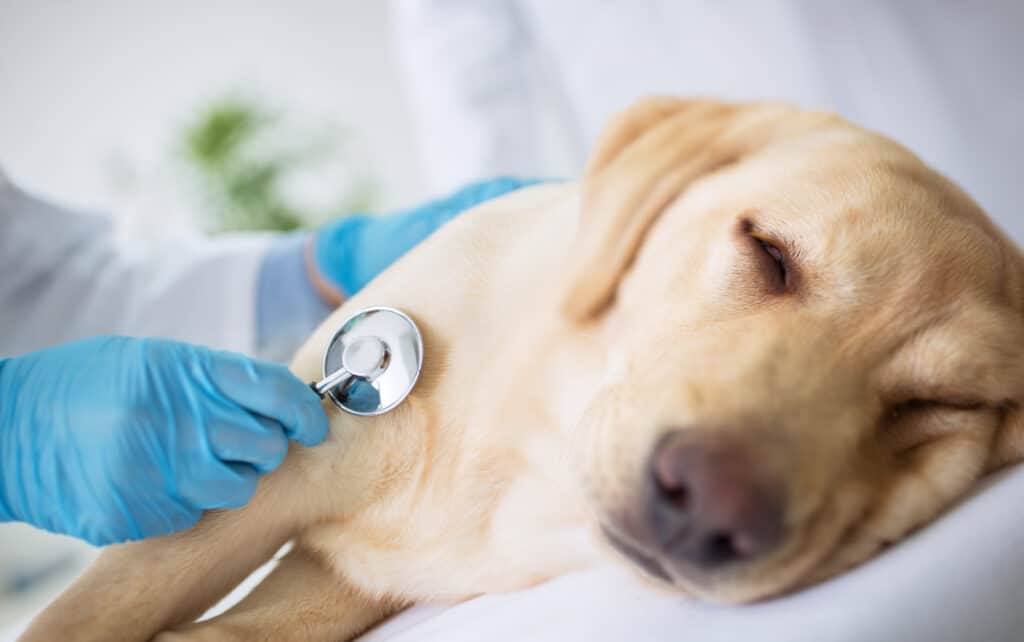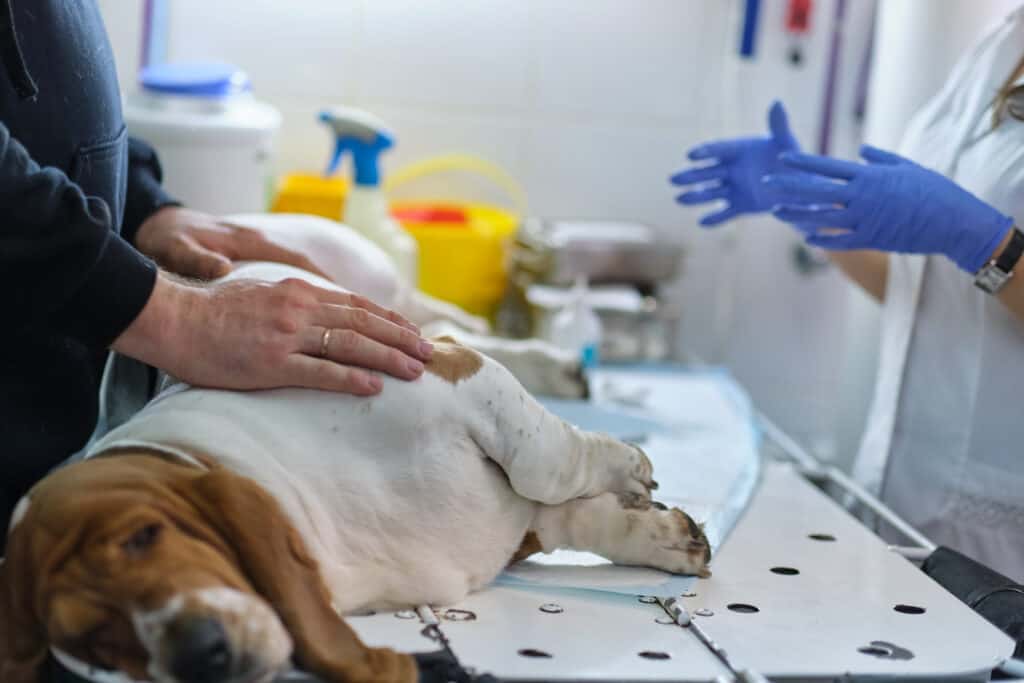Coffee is toxic for dogs and shouldn’t be given to dogs in any situation. While we may enjoy a jolt of caffeine in the morning, that jolt may be a little much for our dogs.
Dogs are much more sensitive to caffeine than humans. Therefore, even a tiny amount of caffeine can cause dogs to develop side effects. Luckily, it does take quite a bit of caffeine for dogs to need veterinary attention. However, that isn’t a reason to tempt fate by giving your dog coffee.
However, coffee isn’t the only thing that contains caffeine. Several products contain caffeine – some very common in our homes.
What Happens if a Dog Eats Coffee?

The caffeine found in coffee is toxic to all dogs.
©Javier Brosch/Shutterstock.com
The size of your dog and the amount of coffee they ingest matter. Bigger dogs are less susceptible to caffeine toxicity as they weigh more. Smaller dogs are more susceptible to caffeine due to their size. However, coffee is toxic to all dogs, no matter their size or breed.
While humans have to drink a lot of coffee to develop adverse effects (usually), dogs have to drink a lot less. Small dogs may only need a few licks to start feeling the stimulating effects of caffeine, for instance.
If your dog drinks too much coffee, it may develop caffeine toxicity. Most of the signs of caffeine toxicity come from the stimulating effects of caffeine. Imagine drinking four cups of coffee, and you’ll know how your dog may feel.
Caffeine Toxicity
Once your dog consumes caffeine, it may have a higher heart rate than average. Hyperactivity, such as restlessness, is common. You may notice that your dog vocalizes more than normal or can’t settle down. Luckily, if these are the only signs that develop, they should disappear after a few hours.
However, caffeine toxicity develops after your dog consumes way too much caffeine. For instance, caffeine can raise blood pressure and cause other cardiac problems. These can be especially dangerous. Some dogs may even lose control of their muscles or have seizures.
Caffeine will also cause stomach upset. Your dog may vomit and have diarrhea. Vomiting isn’t always bad, as it can dispel some of the caffeine from the digestive tract. However, too much vomiting can cause dehydration, which dogs with caffeine toxicity may already have. Pets tend to urinate more as their body filters out the caffeine.
Caffeine can be deadly to dogs in many cases. If your dog overeats and doesn’t get treatment, the seizures can lead to coma and death.
How Much Coffee Is Safe for Dogs?

Dogs that consume too much coffee may require vet care.
©didesign021/Shutterstock.com
Dogs are much more sensitive to caffeine and coffee than people. Coffee is toxic to dogs in large amounts.
With that said, one or two sips of coffee aren’t likely enough to cause adverse effects. However, caffeine pills or eating coffee grounds can be. Lighter coffee roasts tend to have more caffeine than other types of coffee. The longer the coffee is roasted, the less caffeine it will contain.
Symptoms usually start about 30 minutes after the dog drinks or eats coffee. The signs can last for up to 12 hours in some cases. However, they typically go from minor to serious an hour after ingestion. Therefore, getting your dog to the vet quickly is vital.
Coffee can also contain other ingredients, like sugar and stimulants. Therefore, you should also be cautious of the other things in the coffee – not just the caffeine.
The effects your pet may experience depend on their size, how much they consumed, and their weight. Younger, healthier, larger dogs may have a better outcome than an older dog with underlying problems. However, caffeine can damage many of the organs in the body, including the kidneys, heart, and brain. Therefore, dogs who overdose on coffee once may be more susceptible to the effects if it happens again.
No amount of coffee is safe for a dog. Their organs may be harmed even if the dog doesn’t develop seizures. Therefore, we recommend keeping all your coffee and other caffeine-containing products clear of your dog’s reach.
How Is Caffeine Toxicity Treated?

Veterinarian care is often needed for caffeine toxicity.
©Yavdat/Shutterstock.com
Early treatment is vital to prevent complications from consuming too much caffeine. As you might expect, you preferably want to have the dog at the vet before seizures develop. Therefore, if you know that your dog consumed coffee, we highly recommend contacting your vet or the animal poison control center.
Preferably, you want to have the type of coffee, and the amount consumed written down. This allows vets to determine if your dog needs treatment or not. However, even if you don’t have this information, call your veterinarian immediately.
If your pet needs veterinary care, your vet may induce vomiting to remove as much caffeine from your dog’s system as you can. Sometimes, activated charcoal may be administered to prevent more caffeine from being absorbed by the body. However, these methods are only successful if much caffeine has yet to be absorbed. Again, quick treatment is vital.
In the meantime, your vet may also administer IVs and other medications. The symptoms of the toxicity will need to be controlled. IVs can prevent dehydration, and anti-seizure drugs may be given to dogs who consume lots of caffeine.
Medications to lower blood pressure and support the heart may also be needed. Once again, it depends on your dog’s symptoms. Your dog will need to be monitored in most cases, which often means hospitalization. Severe cases may require several days of treatment, while mild cases may only require 24 hours.
Conclusion
Coffee is toxic to dogs because it contains caffeine. Caffeine does the same thing to dogs that it does to people. Only dogs are far more susceptible to caffeine. Therefore, it takes a lot less coffee for them to develop caffeine toxicity. Therefore, even a few sips may cause dogs to develop adverse effects.
As for most toxins, fast treatment is vital. You want your dog to get treated before severe symptoms develop. Preferably, you want the treatment to dissipate the caffeine content in your dog’s stomach before it can be absorbed through the intestinal walls. If this isn’t possible, you at least want your dog at the vet when more severe symptoms develop so they can be treated immediately.
Luckily, with treatment, coffee is not usually deadly. The prognosis is good if the correct medications and treatments are administered.
Up Next
The photo featured at the top of this post is © iStock.com/Lazy_Bear
Ready to discover the top 10 cutest dog breeds in the entire world?
How about the fastest dogs, the largest dogs and those that are -- quite frankly -- just the kindest dogs on the planet? Each day, AZ Animals sends out lists just like this to our thousands of email subscribers. And the best part? It's FREE. Join today by entering your email below.
Thank you for reading! Have some feedback for us? Contact the AZ Animals editorial team.






